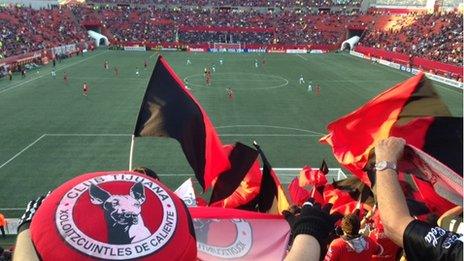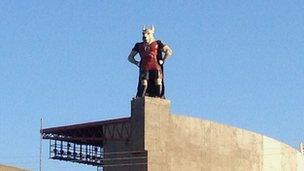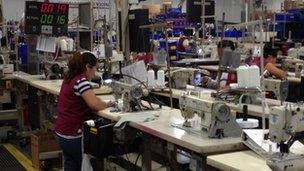Why US firms are turning to Mexico, leaving China behind
- Published

Footbal fever in Tijuana
A giant statue of a hairless Mexican dog wearing a superhero cape greets Tijuana football club fans arriving for a Latin American showdown.
The Xolos soccer team (pronounced show-lows) take their name from the breed of dog standing on its hind legs atop the still-unfinished stadium - it just happens to be the club owner's favourite pet.
Barking blasts from the speakers and fans go crazy with trumpets and red and black flags as the current Mexican champions take on a Brazilian team in a Latin American championship match.
Mexico is not only confident - it's now playing in the big leagues.
Chinese wages quadruple
After years of violence linked to the drugs war there is finally something to cheer about in Tijuana: a successful football team that did not even exist six years ago, a lower murder rate and an economy on the rise.
Behind a small, unlikely-looking shop front on the edge of town, a group of talented young software engineers and designers are also creating something from nothing.

The Xolo looms over the football stadium in Tijuana
With a loud whir and a rush of air, a small six-rotored flying drone takes off and is carefully navigated around the small, high-tech production line.
The company is called 3D Robotics and was co-founded by Silicon Valley entrepreneur Chris Anderson and his Mexican computer whiz-kid partner, Jordi Munoz.
The 26-year-old Mr Munoz was one of the few local businessmen scheduled to meet President Barack Obama during his trip to Mexico this week.
The two founders met online and started producing robots in China but then realised it made better business sense to have one factory in San Diego and another just over the border in Tijuana. Wages in China have quadrupled.
"If you net in all our costs now it's almost at price parity with Shenzhen," Chris Anderson said. "That part of southern China has become more expensive and Mexico is staying pretty much flat.
"When you add in all those external costs - time, shipping, someday perhaps environmental costs, then they start to be very similar to China, and from an innovation perspective short supply chains are better.
"Twenty years ago Mexico was about cheap labour; today it's about highly skilled labour that's cost-competitive."
Mexico has more international trade deals than any other country, and exports as many goods as the rest of Latin America combined.
There has always been an electronics manufacturing hub in Tijuana, but Chinese competition damaged its business a decade ago.
Now rising wage costs in Asia and a higher exchange rate are prompting many companies targeting the US market to take another look at Mexico.
Corruption clampdown
DJO Global runs a huge medical supplies factory in Tijuana, where they make a whole range of things like knee supports, neck braces and plastic leg casts.
The company almost went bust 10 years ago, but has turned things around through a streamlined production line and a move back to Mexico.
"Now the wages in China are more than they were before, that's one thing, then China is six weeks away from the most important market, which is the US," said Armando Vega Garduno, director of manufacturing and operational excellence.
"So we are migrating all the production we had in China and moving it here. Fifty per cent of what we used to bring from China is now manufactured in this facility."

Manufacturing medical supplies is big business in Mexico
Tijuana's reputation for violence precedes it, but both the police chief and the mayor say the city is considerably safer than it was two years ago.
"The perception has lingered, but our murder rate is down 70% or more," said Mayor Carlos Bustamante.
"It's been a combination of citizen participation, the co-ordination with the military and the state and federal government and the cleaning out of the police."
Six hundred officers were sacked from Tijuana's police force and the lawyer-turned-police chief Jesus Alberto Capella is now high on the drug cartels' hit list for his fight against corruption.
He has 10 bodyguards and receives death threats every day. The violence is still a problem, but the city mortuary is no longer overflowing.
The new Mexican President Enrique Pena Nieto wants to put a new spin on the country with the image of a booming economy and as a good place to do business.
Security and the drugs problem still dominate talks between the US and Mexico, but its southern neighbour's increasing importance in the global economy is changing the relationship.
- Published3 May 2013
- Published2 May 2013